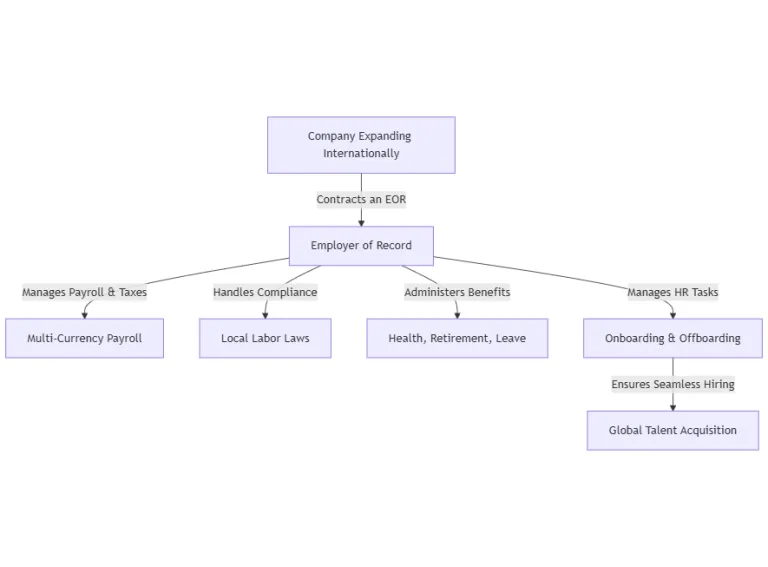
Employer of Record Benefits include streamlined global hiring, compliance with local laws, reduced risks, and faster market entry. With an EOR, businesses can expand internationally without setting up costly entities.

Employer of Record Benefits include streamlined global hiring, compliance with local laws, reduced risks, and faster market entry. With an EOR, businesses can expand internationally without setting up costly entities.

Globally expanding a company is no minor task, and employing internationally offers many legal, administrative, and compliance issues. For companies exploring worldwide growth, knowledge of what an EOR is and how it operates is important. An Employer of Record (EOR) streamlines this process so that businesses like yours may recruit and manage employees anywhere without creating a legal company in every nation we deal with.
This blog looks at the wide range of employer of record benefits, how they enable smooth global expansion, and why companies wishing to grow abroad find this tool to be essential. To present a whole picture of this employment alternative, we will also look at the positives and drawbacks of employer of record policies, as well as possible risks.
Third-party companies known as Employer of Record (EOR) lawfully hire employees on behalf of a business, handling payroll, taxes, compliance, benefits administration, and HR operations abroad.
As the client company, you keep complete operational control over the activities and responsibilities of the employee; the EOR assumes the legal risks and liabilities related to employment, therefore guaranteeing compliance with local labor regulations.
An EOR serves as a comprehensive HR partner by offering a wide range of essential services, including:
Managing payroll across different jurisdictions is complex due to varying tax laws, currency exchange considerations, and social security obligations. An EOR streamlines payroll processing by:
Each country has unique labor laws, making contract drafting a legal minefield. An EOR:
 3. Employee Benefits Administration
3. Employee Benefits Administration
Attracting and keeping top performance depends on providing competitive rewards. An EOR guarantees staff members have:
Hiring foreign employees often requires work permits and visa sponsorships. An EOR manages:
A seamless hiring and exit process enhances employee satisfaction. EORs handle:
Establishing a legal organization overseas might take months and call for a large financial outlay. Using an EOR, companies can begin employing in a few days and obtain a competitive edge by:
Navigating foreign labor laws is challenging. An EOR ensures full compliance with:
Establishing an entity calls for large expenses, including HR resources, legal bills, and office space. An EOR removes these costs so that businesses just like ours can:
Paying international employees requires managing multiple currencies and exchange rate fluctuations. An EOR ensures:
Cultural nuances and labor laws vary significantly. An EOR provides:
As companies grow, hiring in multiple countries becomes necessary. An EOR facilitates:
Managing international employment comes with extensive paperwork and regulatory requirements. An EOR:
A well-managed EOR ensures employees feel secure and valued by:
Businesses often need to scale operations quickly or enter and exit markets with minimal commitment. An EOR:
Employment law violations can lead to fines and reputational damage. This is where an EOR can come into play. EOR helps:
While an EOR provides numerous advantages, there are potential employer of record risks to consider:
Employer of Record (EOR) helps companies grow internationally, free from the legal complexity, payroll issues, and compliance concerns. Companies like ours may concentrate on operations scaling and guarantee flawless personnel management across worldwide markets by means of a strategic EOR cooperation.
Choosing a reliable EOR provider will help us to improve compliance, accelerate worldwide hiring, and properly maximize human resource operations.
The 30 Best HR Software Solutions for 2025 (Reviewed & Compared)
Explore the top 30 HR software solutions of 2025. Compare payroll, hiring, and compliance tools to choose the best HR platform for your business needs.
Peorient is your independent EOR & PEO advisor, helping businesses hire globally, stay compliant, and grow faster.
Copyright © 2025. All Rights Reserved
Website security powered by MilesWeb